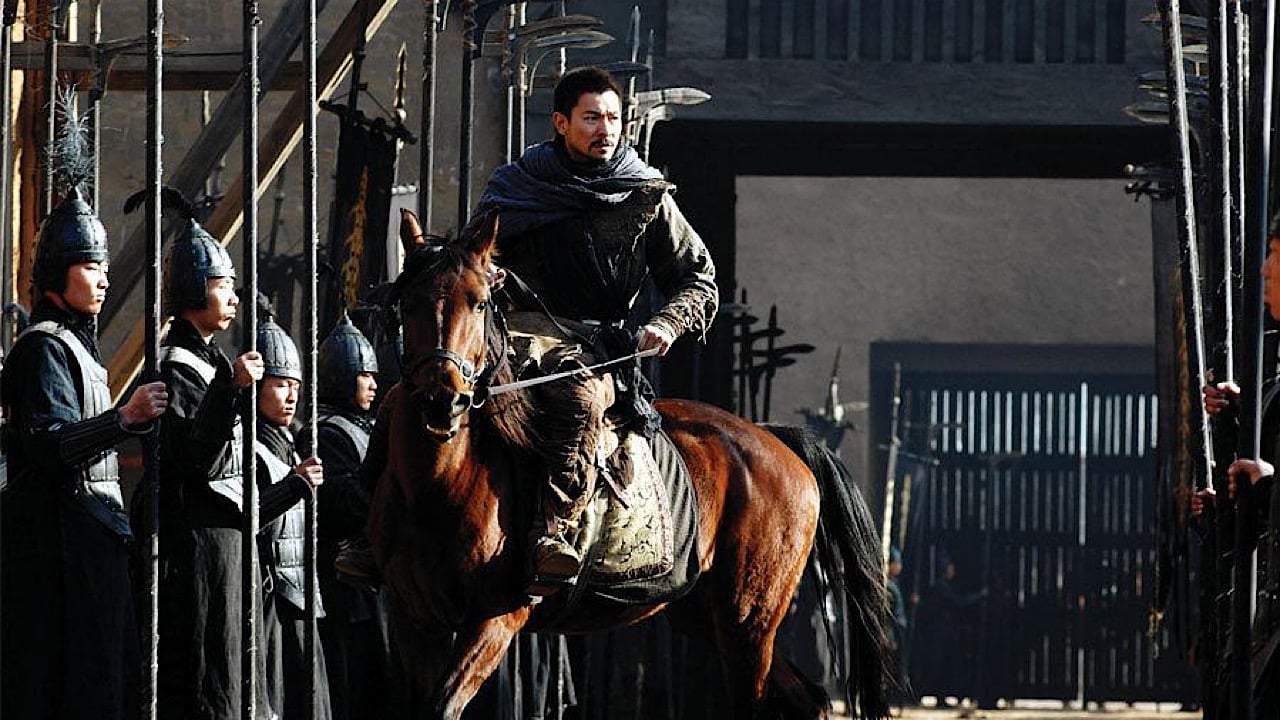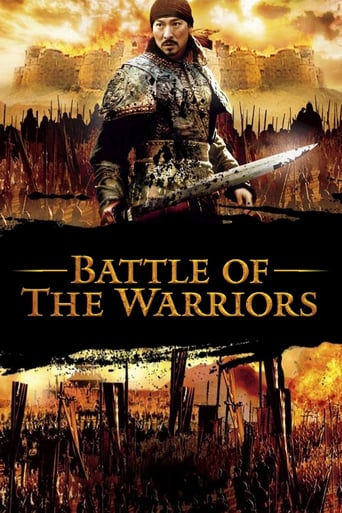

This film is based on Bokko, one of the finest Japanese manga ever crafted, about one man - Ge Li - sent to defend a besieged city in ancient China. Andy Lau here plays the main character, effectively downplaying his super-stardom with a delicate, subdued and humble performance. Apart from him, we get epic battles with twists, a couple of very nifty strategic ideas, and all the grievances and politics of the besieged city of Liang come to a boiling point. Ge Li has to fight enemies from within and without.Chinese filmmaking often draws upon that nation's very rich literary heritage, and it's often exciting to see the best it has to offer when that heritage blends with great aesthetics backed up by an important budget. "Hero" comes to mind of course, probably as the pinnacle of the genre. But even that film belies a worrying trend in mainstream Chinese film: ideological bullying. Back to this in a second...Technically, the film is of course very competently made, the period and city are created to perfection, even if the visual style is never more than generic. Where things begin to go sour is in the characterizations. The source manga has very rich, complex characters, and while it is unfair to condemn a film under 3 hours for failing to capture the wealth of a 400+ page graphic novel, one wonders why the filmmakers did not cut content for the sake of depth rather than the opposite. A lot happens very quickly, and it is very hard to care for anyone but Lau's Ge Li. This problem is further compounded by the apparently chronic irrationality of many characters: they act in frustrating ways, seemingly just because the film requires them to in order to complicate the hero's predicament.On the previously mentioned ideological front, things become downright risible. The source manga is a tribute to the value of the individual and the vices of the ruling class. On the other hand, the film suggests (word for word in one scene) that only unity will end war in China, and the leader of the invading army is made into a far more compelling human being than any of the inhabitants of the besieged city. In the end, the film is a case study in how filmmaking by committee leads to bland and idiotic results: nonexistent character, crude ideological content, spectacle for its own sake and a total absence of personality.But it has two good things going for it: first, it might get you to read the infinitely superior manga. The second reason is a man named Andy Lau.
... View MoreI saw some of the reviews here and wasn't expecting much. I was expecting a bit of a muddled mess like "The Promise". However the movie was much tighter, the storyline was quite good and up until the point where Lau's character leaves Liang it was excellent. The ending sequence wasn't up to par with the rest of the film, otherwise I would have given it a 9. There seemed to be a bit of disorganization in the last 30 minutes that didn't seem to fit the rest of the film. But it is still strong enough for me to recommend. Cinematography is good. The directing seemed competent. Andy does well although his character is a bit of a one-note type of person. The 'love interest' seemed a bit forced but then again, I've seen much worse from Chinese movies.8/10
... View MoreHaving just seen this film, it may be awhile before I can complete my opinion of it. I do not know if it was the poor translations in the subtitles, some confusing storytelling with the subplots, or a combination of both that made many of the finer points difficult to understand. I suspect the third option. As another reviewer said, this movie does have a message, and a potentially very interesting one, but I found that many of the events in the film meant to illustrate it were not well defined enough to be completely comprehensible. It is easy to confuse side characters whose names are not made clear and who look very similar in their armor. Other details, like why certain people are now outside a besieged city when they were in it earlier, also seem confusing -- I expect it all does make sense, but the movie could have done a better job of explaining the finer points of what was happening, what with the many double-crossings and irrational violence that happens. And some other things, like a romantic subplot, weren't fleshed out enough for me to buy -- it seemed a little too Hollywood-ish in setup.Nonetheless, it is a very interesting movie, visually and story-wise. The main character Ge Li is intriguing and charismatic, well-played by Andy Lau. He is an idealist with great integrity, and he often is alone in his beliefs, but still he uses his great tactical ingenuity to try to defend the city of Liang. This is the film's setup. How it plays out is also quite interesting, though as I said above I found many of the points confusing which otherwise might have added the extra meaning to gain this movie a higher score.Visually it is very good. Lots of money was spent well, and it has the feel of a real, legitimate battle, with much of the brutality though thankfully not the gore. It doesn't glamorize war, but regards fighting for the defence of one's nation or innocents as often necessary. Yet while it is a bit more contemplative and intelligent than your average medieval epic, it still does work as entertainment. There are some scenes that are just neatly push the film over from pure serious historical war drama into fun action flick. They stick out a little bit, but not enough to ruin anything.In short: it is an interesting, fun, and sometimes clever film, a bit confusing at times with its subplots and side characters, but grounded by an interesting and admirable protagonist. Not a necessary film or a great one, but a pretty good one all the same.
... View MoreThe first thing to be gotten "out-of-the-way" when watching "Battle of Wits" is the somewhat dubious production values (camera-work, lighting, editing,etc.), resembling more of a TV-movie than a "Hollywood epic"-- but its story/ material is EXCELLENT! It is essentially an "idea/ issue" movie-- the characterization is one-dimensional and the events just serve as "platforms" for ideas/ issues of Mozi philosophy. And it is this very approach which will annoy some viewers and delight others.Like Crouching Tiger Hidden Dragon-- whose success give investors the confidence to finance "Battle of Wits"-- people are going to have problems the "genre-bending" nature of this movie.... Historical "fantasy" film? Philosophical "war" movie? It attempts various "movie" moments-- e.g. the rather obvious CGI sequence of the first full-on assault which, unlike the beautiful but stupid sequence in Hero, shows a "full" army and what each section of the army is doing. Yet it refuses to dwell on gratuitous or "entertaining" imagery.But thanks to the director, the realistic "mood" set in the movie is enough to make the audience winced even when the gory scenes are NOT shown-- you are taken "into" the warfare where there is a rather disturbingly level of groaning. And the bodies and burials, the defenders are always taking people out of the city for burial.While some may complain about its "flow" or "completeness" because it is based on a 11-volume Japanese manga (which in turn is based on a Japanese novel), all the events in the movie are "explicable" (even historically "inspired")-- although they are not that well "depicted/ edited"... if only they had better special effects directors and action choreographers (& lots more $).True to the sign of the times, "Battle of Wits" is:1) a SNAFU (anti-)war movie. That is "Situation Normal- All F**ked Up"-- or everything which can go wrong will go wrong. The tagline of the movie is "100,000 vs 5,000" I think, so it's not too much of a spoiler to point out that the morale or "spirit" of the defenders is so low that it is always "cracking up". OTOH, the morale or "spirit" of the invaders is so high that they treat it as a game and "crack up" whenever something unexpected happens.2) a "Casualties of War" movie. Those being the times of "maiming" arrows & fire, rather than "instant-kill" bullets and bombs, everyone who is shot, hurt or dying screams in pain and cries out for help (enslaving rather than killing POW was the rule in those times-- which First Emperor Qin happily ignored). So unlike Hero or even Lord of the The Rings where the arrow volleys are just beautiful to look at, the "realistic" mood set by "Battle of Wits" makes the crossfire "ugly".3) a "Psych-war" movie.Throughout the movie, people are always messing around with other people's heads-- even when they are not sure what he is doing (yes, Psych-war involves "lying", err, I mean "propaganda"). So there's a lot of talking (& action) which seems to goes "nowhere" if you don't see psychological significance.ADVICE: don't be late and don't watch it when you're tired (2 hours 15 mins) because:i) the narrative pace is almost relentless (it slows down only towards the end), and many things are "explained" with just one line or one shot-- here's hoping someone will invest and make a detailed and better paced TV series out of the source material, or even a sequelii) it is definitely NOT made for "international audiences"-- the director does NOT bother to explain the historical, cultural or philosophical background and the minimal budget means that many sequences are very "tightly" edited. But that also explains why the Chinese (Mainland, HK & Taiwan) are loving it (more so than Zhang Yimou's *cough* "epics").iii) Mozi philosophy is full of controversies (which are not "resolved" in the movie)-- many characters in the movie get struggle with the Mozi philosophy and suffer for it, because practising the Mozi philosophy would require forsaking almost everything else (affection, glory and riches).
... View More